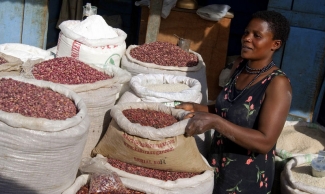 More than 1.3 million Kenyan farmers do not have any maize seeds to plant and around 3.7 million people in Kenya are food insecure. The demand for seeds in 13 countries in Africa combined is around 0.5 million tonnes, with the supply being only 0.2 million tonnes. “40 per cent of the demand being met,” said Joseph Devries, the Director of Programme Africa for Seeds Systems (PASS).
More than 1.3 million Kenyan farmers do not have any maize seeds to plant and around 3.7 million people in Kenya are food insecure. The demand for seeds in 13 countries in Africa combined is around 0.5 million tonnes, with the supply being only 0.2 million tonnes. “40 per cent of the demand being met,” said Joseph Devries, the Director of Programme Africa for Seeds Systems (PASS).
Shortage of the foundation seed in Kenya, the original seed from which the other seeds are created, is leading to a shortage in stock of seeds. 60 per cent of maize grown in Kenya is grown from hybrid seeds. However, according to KARI, around 1-2 per cent of farmers are using improved potato seeds. Public companies, such as Kenya Seed Company, are allowed to make foundation hybrid seeds, but are unable to produce enough stock and enough variety of seeds and private companies are not allowed to produce foundation seeds for hybrids other than maize.
Seed companies, in an effort to meet the demand for seeds, are contracting farmers to grow seeds for them. They then buy the seeds from the farmers, at double the price the farmers would sell them in the markets. Douglas Tere, from the Ministry of Agriculture, said, “At the moment, seed companies in Kenya have contracted about 10,500 farmers since the model was introduced in 2010. The model is becoming popular very fast and is projected to hit the 50,000 mark in the year 2015.”
The farmers are being trained in farm management, learning to use minimal amounts of pesticide, harvesting and extracting and marketing seeds. They have also learned how to multiply foundation seeds, while being supervised by extension workers.
The farmers who have undergone training have experienced at 60-70 per cent increase in yield. The farmers are selling seeds to major seed companies in the country like the Lagrotech Seed Company, who package the seeds for sale, but the farmers expect to package their own seeds in the future.
Though contract farming is helping to compensate for the seed shortage caused by the low numbers of foundation seeds, the lack of seeds and the food insecurity in Kenya is also being blamed on the fact that so many fake and low quality seeds are being sold instead of good quality, high yield seeds. These low-quality seeds are disappointing in terms of yield, and do not provide enough food or seeds to replant. In addition, the drought has made it very hard for farmers to plant and grow crops, and many of them have resorted to eating the seeds rather than sparing them for the next harvest.
“Famers lack seeds because they don’t produce enough maize and end up consuming everything,“ said James Samo, who specializes in agricultural production at the Ministry of Agriculture, in an earlier interview.
Good quality, certified seeds are expensive, and only a few Kenyan farmers can afford them according to Ministry of Agriculture statistics.
These seeds have better yield than the seeds most farmers can afford. As a result, a lot of farmers end up using retained seeds, which have yields of 25-30% lower than the yield of hybrid seeds in the first harvest. In harvests after that, yield tends to drop 50%. “The government should either heavily subsidize certified seeds to bring their prices down considerably to improve access by farmers, or put greater efforts in rolling out extension services to improve what is produced through traditional initiatives such as community seed banks and farm-owned seeds,” said Wesley Koech, a food security analyst at University of Nairobi, in an earlier interview with IRIN.
“In most rural shops, seed and fertilizers are sold in bulk sizes that most poor farmers cannot afford. Smallholder farmers are largely an untapped, underserved market," said Mrs Jayne Leakey, the director of Ledlet Seed Company. She became involved in the seed industry when she realized it was difficult to obtain different varieties of improved seeds for her own farm.
Ledlet Seed Company Ltd. in Nakuru packages seeds in smaller, cheaper packages than other companies do, therefore making seeds more available and affordable to small-scale farmers.
Instead of selling large packages of 50 kilograms for 2,000 or 3,000 shilling, the small packets of seeds sell at 10 shillings for 80 grams or 50 shillings of 400 grams.
According to AGRA (Alliance for the Green Revolution in Africa), small seed companies play a vital role in the supply and distribution of seeds. Varieties of improved seeds are the most cost efficient seeds for small-scale farmers, and will provide them with a high yield of crops. And as the vagaries of weather persists, farmers are now heeding to the experts call to scale up production of orphaned crop seedlings like the African Indigenous Vegetables (AIVs) as health savvy Kenyan middle class drives up the uptake of the AIVs.
















Comments powered by CComment